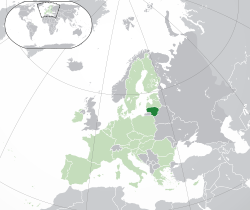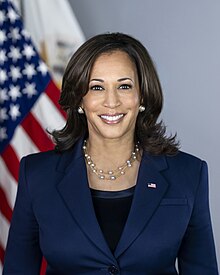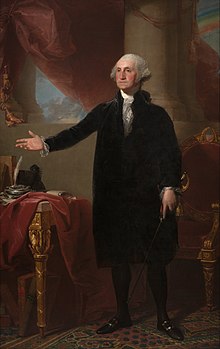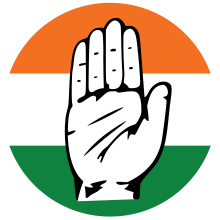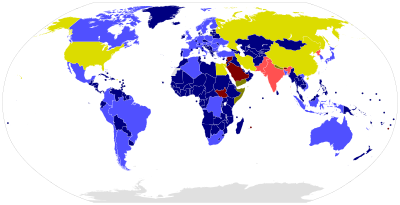Portal:Politics
| Main | Topics and categories | Tasks and projects |
The Politics portal
Politics (from Ancient Greek πολιτικά (politiká) 'affairs of the cities') is the set of activities that are associated with making decisions in groups, or other forms of power relations among individuals, such as the distribution of resources or status. The branch of social science that studies politics and government is referred to as political science.
It may be used positively in the context of a "political solution" which is compromising and non-violent, or descriptively as "the art or science of government", but also often carries a negative connotation. The concept has been defined in various ways, and different approaches have fundamentally differing views on whether it should be used extensively or in a limited way, empirically or normatively, and on whether conflict or co-operation is more essential to it.
A variety of methods are deployed in politics, which include promoting one's own political views among people, negotiation with other political subjects, making laws, and exercising internal and external force, including warfare against adversaries. Politics is exercised on a wide range of social levels, from clans and tribes of traditional societies, through modern local governments, companies and institutions up to sovereign states, to the international level.
In modern nation states, people often form political parties to represent their ideas. Members of a party often agree to take the same position on many issues and agree to support the same changes to law and the same leaders. An election is usually a competition between different parties.
A political system is a framework which defines acceptable political methods within a society. The history of political thought can be traced back to early antiquity, with seminal works such as Plato's Republic, Aristotle's Politics, Confucius's political manuscripts and Chanakya's Arthashastra. (Full article...)
Selected article
Feminism is a collection of movements and ideologies aimed at defining, establishing, and defending equal political, economic, and social rights for women. In addition, feminism seeks to establish equal opportunities for women in education and employment. A Feminist is "an advocate or supporter of the rights and equality of women". Feminist theory, which emerged from these feminist movements, aims to understand the nature of gender inequality by examining women's social roles and lived experience; it has developed theories in a variety of disciplines in order to respond to issues such as the social construction of sex and gender. Some of the earlier forms of feminism have been criticized for taking into account only white, middle-class, educated perspectives. This led to the creation of ethnically specific or multiculturalist forms of feminism. Feminist activists campaign for women's rights – such as in contract law, property, and voting – while also promoting bodily integrity, autonomy, and reproductive rights for women. Feminist campaigns have changed societies, particularly in the West, by achieving women's suffrage, gender neutrality in English, equal pay for women, reproductive rights for women (including access to contraceptives and abortion), and the right to enter into contracts and own property. Feminists have worked to protect women and girls from domestic violence, sexual harassment, and sexual assault. They have also advocated for workplace rights, including maternity leave, and against forms of discrimination against women. Feminism is mainly focused on women's issues, but because feminism seeks gender equality, some feminists argue that men's liberation is a necessary part of feminism, and that men are also harmed by sexism and gender roles.
Featured picture

The western (front) side of the United States Capitol. The U.S. Capitol serves as the location for Congress, the legislative branch of the U.S. federal government. It is located in Washington, D.C., on top of Capitol Hill at the east end of the National Mall. The building is marked by its central dome above a rotunda and two wings. It is an exemplar of the Neoclassical architecture style.
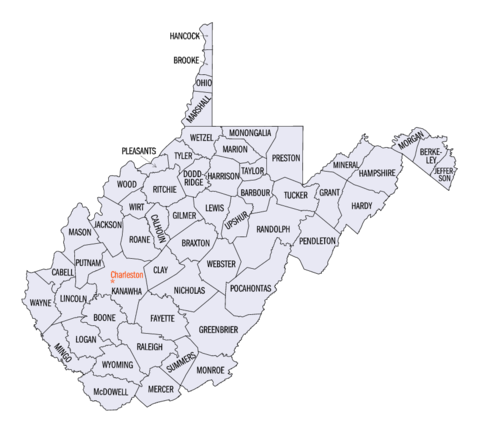
The U.S. state of West Virginia has 55 counties. Fifty of them existed at the time of the Wheeling Convention in 1861, during the American Civil War, when those counties seceded from the Commonwealth of Virginia to form the new state of West Virginia. West Virginia was admitted as a separate state of the United States on June 20, 1863. Five additional counties (Grant, Mineral, Lincoln, Summers, and Mingo) were formed from the original counties in the decades following admission.
After the Civil War, Berkeley County and Jefferson County, the two easternmost counties of West Virginia, refused to recognize their inclusion in the state, and the Virginia General Assembly passed legislation attempting to reclaim them. In March 1866, the United States Congress passed a joint mandate assenting to their inclusion in the new state, and the Supreme Court of the United States confirmed this outcome in the case of Virginia v. West Virginia (1871). (Full article...)
Selected quote
Selected biography
Cosmo Gordon Lang (1864–1945) was an Anglican prelate who served as Archbishop of York and Archbishop of Canterbury. As Archbishop of Canterbury during the abdication crisis of 1936 he took a strong moral stance, and comments he made in a subsequent broadcast were widely condemned as uncharitable towards the departed king. In his early ministry Lang served in slum parishes in Leeds and Portsmouth before his appointment in 1901 as suffragan Bishop of Stepney in London. In 1908 Lang was nominated Archbishop of York, despite his relatively junior status as a suffragan rather than a diocesan bishop. He entered the House of Lords as a Lord Spiritual and caused consternation in traditionalist circles by speaking and voting against the Lords' proposal to reject David Lloyd George's 1909 "People's Budget". This apparent radicalism was not, however, maintained in later years. At the start of World War I, Lang was heavily criticised for a speech in which he spoke sympathetically of the Kaiser. After the war he supported controversial proposals for the revision of the Book of Common Prayer, but after acceding to Canterbury he took no practical steps to resolve this issue. As Archbishop of Canterbury he presided over the 1930 Lambeth Conference, which gave limited church approval to the use of contraception.
Did you know (auto-generated) -

- ... that despite most of the polls and 50 major political writers predicting victory for Thomas E. Dewey, Harry S. Truman won the 1948 presidential election?
- ... that Czech television reporter and author Vladimír Škutina was arrested and imprisoned twice for his use of political satire?
- ... that reporter O. Kay Henderson, who has interviewed U.S. presidential candidates, is considered by national media to be an Iowa political authority?
- ... that Poles who fought in the Russian Partition during the January Uprising were detained as political prisoners in Magdeburg and Graudenz, Prussia, even though the uprising never crossed the border?
- ... that Valentina Bodrug-Lungu has declared that Moldova's political climate does not encourage female participation, despite having a woman president?
- ... that Liu Yu has been called "one of China's best-known America-watchers" and "China's de Tocqueville"?
More did you know...
- ...that the first phase of Mitt Romney's 2012 U.S. presidential campaign was announced via a video message?
- ...that four member states of the European Union have de jure opt-outs and do not participate fully in all common policies?
- ...that Cornelius, Oregon is named after pioneer Thomas R. Cornelius, who served in the both the Territorial and State legislatures?
- ...that the Society of the Friends of Peasants had significant influence on the Danish Constitution of 1849?
- ...that Chinese Taipei is the designated name the Republic of China (Taiwan) uses in most international organizations?
- ...that during the Sixth Congress of the Cuban Communist Party, Raúl Castro proposed term limits for the country's leaders?
In this month
- June 28, 2004 - Canadian federal elections occur; the Liberal party loses its absolute majority.
News and Current events
- August 11: 4 local government areas in New South Wales, Australia locked down after COVID-19 case
- August 11: Australia: AstraZeneca vaccine access expanded by Victorian government
- August 1: Australia: Victorian lockdown lifted
- July 29: Tunisia's president dismisses prime minister, suspends parliament
- July 25: Australia: Wikinews interviews Reg Kidd, mayor of the City of Orange, about COVID-19 lockdown and local government
- July 23: South Australia enters week-long lockdown to contain COVID-19 Delta variant spread
- July 21: Technological University Dublin senior lecturer Dr Lorcan Sirr speaks to Wikinews on housing market in Ireland
- July 21: Three rural councils in New South Wales, Australia enter 7-day lockdown
- July 21: Australia: Victoria lockdown extended by a week with 85 active cases recorded
- July 15: California governor signs new state budget, eligible Californians to get stimulus payments
Topics and categories
General images
Related portals
Associated Wikimedia
The following Wikimedia Foundation sister projects provide more on this subject:
-
Commons
Free media repository -
Wikibooks
Free textbooks and manuals -
Wikidata
Free knowledge base -
Wikinews
Free-content news -
Wikiquote
Collection of quotations -
Wikisource
Free-content library -
Wikiversity
Free learning tools -
Wiktionary
Dictionary and thesaurus
Sources
More portals
- Portals with triaged subpages from June 2018
- All portals with triaged subpages
- All portals
- Portals with no named maintainer
- Random portal component with 41–50 available subpages
- Random portal component with 16–20 available image subpages
- Automated article-slideshow portals with 101–200 articles in article list
- Random portal component with 11–15 available subpages
- Random portal component with over 50 available subpages
- Politics portals
- Politics portal
- Politics







